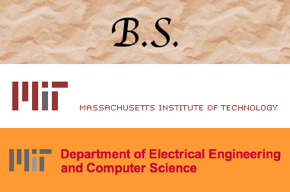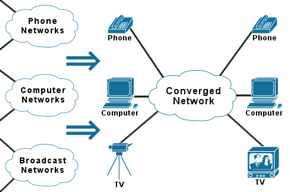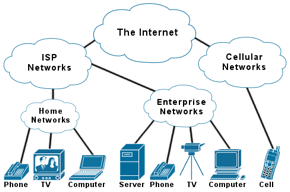
B.S. from MIT in Electrical Engineering and Computer Science
Since Information Technology (IT) is really communication-of-information technology, IT is mostly computer networking. (Cyber is a prefix meaning IT, so for example, IT security is also known as cybersecurity.) "Computer" includes supercomputers, servers, desktops, laptops, tablets, phones (landlines and cells), TV, etc. There has been a "convergence"
 and all of these devices now communicate — their most
important function — over the same network, the
Internet
and all of these devices now communicate — their most
important function — over the same network, the
Internet
 . Thus, being an IT expert means
being a networking expert. (For more see What
is IT and What Makes Me an Expert?)
. Thus, being an IT expert means
being a networking expert. (For more see What
is IT and What Makes Me an Expert?)Networking, at its first, lowest, physical layer (hardware; e.g., cables, wireless), is mostly electrical engineering. At its last, highest, application layer (software; e.g., web programming), it is mostly computer science. However, at either end, extensive knowledge of the other end is necessary. Thus to be a networking expert, you need an education in both electrical engineering and computer science from an excellent university.
Uniquely, the Massachusetts Institute of Technology (MIT) has one department for both electrical engineering and computer science. Students in the department (EECS) ultimately specialize in one or the other but still take the core courses for both ("from atoms to algorithms"). It is essentially a double major.
According to US News & World Report's Best Global Universities rankings, MIT is #1 in computer science and #2 in engineering (all kinds, so MIT may actually be #1 in electrical engineering too) in the world.
Given the difficulty of many theses in the department, my own included, a B.S. from MIT in EECS may be equivalent to an M.S. at other universities. My thesis was designing and building a fiber-optic high-speed serial link — like those used in networks — for a NASA-funded digital astronomical camera because nothing like it was available commercially at the time; see this NASA document and search for "Thresher".
The most important qualification for being an IT expert is an IT education, not experience, since experience without foundational education is meaningless; having worked unqualified for years is not itself a qualification, just a condemnation of the employer. Would you trust your life to a doctor with no medical education or a lawyer with no legal education? See Principles of IT Incompetence (The Most Important IT Credential: An IT Education).
← Previous Entry Next Entry →
